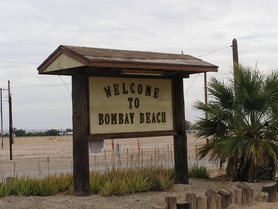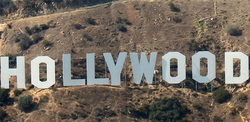
I’m back in the mad land of Los Angeles, the most frustrating place on earth. As my new friend, the writer Charles Coulombe put it, “This is the only city in the world that you can have a love hate relationship with.” Those emotions are felt in the extremes: the hate is strong enough to make you think every day about leaving, but the love is sweet enough to make you stay. It is possible with enough money and a car to spend one’s time only in the bits that you love. But I’m penniless and can’t drive, so every journey to something pleasurable requires a long walk through miles of pain.
One thing I appreciate is the city’s capacity to soak up insanity. Anything you want to do here – from a monkey’s tea part to a Trotskyite whist drive – you can make happen, and some fruitcake will happily join in. On my first night, my pal Rupert Russell (who seems to have graduated from Harvard academic to making adverts) took me to a comic book store on Sunset. We were greeted by a woman dressed as a butterfly. Rupert gave her a password and we were shown to the back of the store. There was a theatre comprised of a small audience of single men, each sitting two chairs apart from each other, their eyes fixed on the stage. The act was a woman in a Guy Fawkes mask signing “Love Will Tear Us Apart Again.” When she finished, there was a quiet round of applause. Catwoman introduced the next act: Wonder Woman and Super Girl singing “Don’t Stop Believing”. It went on like this for an hour. I sat in the back with Rupert, eating a mushroom pizza.
The evening was run by a comic book writer and a former porn actress. Rupert says that back in the early noughties, when the DVD market was really taking off, porn stars gained followings that rivaled mainstream actors. The sordid anonymity of the video (hidden away on the top shelf in a black box) was replaced with a new sense of commercial and artistic self-confidence. This particular actress loved comic books, so the gentleman in the audience hail from the subculture of Marvel fetishists. She is a heroine to them, a silicone goddess. “Of course, the internet has changed everything,” one creature with glasses and a beard told me. “Now you can download barnyard action for free and you won’t know the names of any of the girls in it.” He sighed “Porn has lost a lot of its personality.”
The least pleasant bit of Los Angeles is that for which it is best known: Hollywood. What is so frustrating about movieland is its introspection. I’ve spent a lot of time in politics and journalism – two areas of life that are equally self-obsessed. But they are also fundamentally extrovert: they exist to engage with or to change the world around them. In contrast, Hollywood is eaten up with itself. World War III could break out and all this place would be talking about is how much Shia Labeouf made for appearing in Transformers 4: the Rusting.
That narcissism is especially frustrating for me as I am here, ostensibly, to interview a bunch of celebrities for my book on Hollywood politics. It’s proving tough. Phone call after phone call is met with the same bland, joyless pleasantry (“O how fascinating, can you put that in an email?”), their small talk so empty of promise that sometimes, when I put my ear to the phone, I think I can hear the sea. Hours of deflection wound me up to breaking point. I called the office of Dreamworks CEO Jeffrey Katzenberg and asked to be put through. I mistakenly asked for “Jerry Katzenberg.”
The operator (and she is only an operator remember) said, “We don’t have anyone working here by that name.”
I ended the call and thought about it. Then I rang back and said, “Sorry, do you definitely not have a Jerry Katzenberg there?”
“No,” she replied.
“Do you have anyone by the name of Katzenberg?”
“We have a Jeffrey Katzenberg.”
“O that must be the one I meant,” I said. “But the names aren’t so different, why didn’t you just correct me and put me through?”
“If you can’t be bothered to get Jeffrey’s name right, why should I connect you?”
“Who are you?” I asked. “His mother?”
She hung up.
The bigger problem with getting access to a star is their obsession with image. I want to talk about their politics, a subject that threatens to muddy their profile. They won’t give me access unless they can control every aspect of the conversation, from what is asked to what is written down. An actor is like a corporation. They brand themselves to the hilt and carefully orchestrate every aspect of their waking lives. Working for them is, apparently, Hell. One girl told me that Holly Hunter sacked her for bringing her the wrong label of mineral water. I replied, “Holly who?” The banality of the sin and the situation is my big issue with Hollywood. Structurally it fascinates me – its etiquette, its soft power, its ability to define global culture. But artistically it is dead and socially it’s a total bore. Of course, there are pockets of wonder and wisdom. And the closest a person is to you is measured in how honest they are. If they give you their real age and the correct number of marriages they’ve had, then you’re in.
***
The vanity infects Hollywood’s politics. This evening Rupert and I saw a movie called The Ides of March, directed by George Clooney. Ostensibly it’s about a young staffer on a presidential campaign who is corrupted by the process. In reality, it’s about George Clooney’s fantasy of running for president. In this scenario he is that rarest of creatures: an electable liberal. Cue scenes of him explaining to unibrow Christians why it’s okay to be gay, or why solar polar is a sustainable alternative to the War on Terror. In the real world, Clooney’s candidate would be ranked somewhere beneath Dennis Kucinich, but in movieland he’s the frontrunner for his party’s nomination and a shoe-in for the presidency. His only flaw? Why, the only flaw that Hollywood would understand – sex. His nineteen-year-old squeeze gets pregnant. Whether one is prochoice or prolife, the this subplot is truly execrable. Not only does no one at any point suggest she might keep the child, but the movie’s handling of the physical and emotional realities of her condition would shock even Planned Parenthood. Put it this way: Clooney’s mistress is possibly the first woman in history who dresses for an abortion.
The movie’s lack of moral focus is beside the point. It is an exercise in Hollywood idealism that is now hopelessly detached from reality and no longer heartwarming. It’s time for Mr. Smith to either wise up or quit Washington – his kind of schmaltzy Jimmy Stewart pap won’t cut it anymore. Obama, rumor has it, has disappointed movieland liberals and his donations are down. If that is so then he has my sympathy. At a time when millions are unemployed and the Western world hurtles towards economic oblivion, only Hollywood could continue to express outrage that the Japanese go whaling once in a while, or that Bill and Ben can’t get married in the mosque of their choice.
Yet, for all its absurdities, I still find myself sleepless with paranoia out here. Intellectually it is bereft, but Hollywood always manages to convince me that it matters. Every unanswered phone call drives me insane. I want to walk up to Robert Redford’s front door, bang on it and cry, “Why won’t you talk to me, you SOB?” But he won’t be there; he’ll be away promoting a soap or launching an ice cream. And I won’t even get to the front door because every home is protected by a gate and private security. It’s easier to break into the White House than it is George Lucas’s garage.
For the respite that it offers from this madness, I thank Yom Kippur. Safe in the knowledge that the only reason Richard Dreyfuss won’t take my call is because he’s locked in his house with everything unplugged, I can relax and fool myself that Hollywood loves me – it’s just otherwise engaged. Free from responsibility, I shall hop on a bus to Century City and grab some food at Panda Express. Then I shall while away a couple of hours in America’s greatest innovation, the cigar café. Behind the dark curtain is another of Angelino wonderland, a place where grizzled truck drivers (who otherwise don’t exist on this side of town) gather to drink JD and coke and smoke themselves to death. We shall discuss Sarah Palin’s munificence and I shall fall in love with Los Angeles all over again.



 RSS Feed
RSS Feed